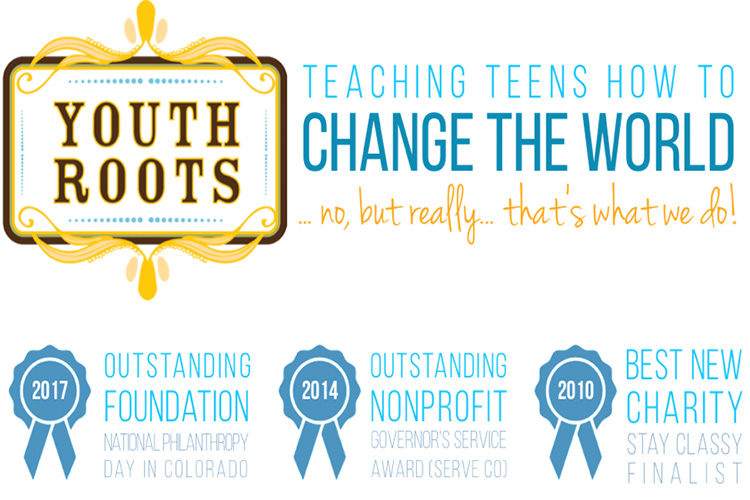
An assembly of youth come together every other week to make change in their local community. photo by Denver Online
Youth philanthropists are molded within the YouthRoots program as the Aurora YouthBoard tackles the problems of access to mental health services, gun violence, and suicide prevention this year.
Along with learning done in classrooms throughout the school year, high school students engaged in the YouthRoots program learn to make change through a unique three-step philanthropic process. First, members brainstorm current issues they would like to combat with input from a Panel of Experts working in the designated fields. The Aurora board chose to learn more about drop-out rates, mental health, poverty, school shootings, and suicide rates. A session was dedicated to asking questions to representatives from the Gang Rescue and Support Project (GRASP), Mental Health Colorado, and the Second Wind Fund about the identified problems.
Information is also gathered by a community needs assessment that members share with fellow teenagers in the community. Questions were framed around ranking the relevancy of five issues: drop-out rates, mental health, poverty, school shootings, and suicide rates. The rankings were on a scale of one to four, with one not being relevant at all and four being the most relevant. The Aurora board gathered 28 responses from a predominantly reflective geographic student body with interspersed data from students in Denver, Englewood, and Lone Tree. Avishi Singh, a second year executive committee member on the Aurora board expressed that “COVID-19 lockdowns threw a lot of social issues into focus because suicide rates skyrocketed, we saw statistics about how it had been the longest gap in school shootings in decades, and across the board mental health declined due to lack of interaction and access to resources at schools and offices.” Research is an integral part of the process that brought the Aurora YouthBoard to focus on mental health, school shootings, and suicide rates.
Fundraising is the next step that emphasizes having youth in the driver’s seat by hosting creative events. In particular, the Aurora board has a game night and a restaurant fundraiser lined up. The game night will serve as an educational purpose for participants with a Kahoot about the three needs and gift cards for the top three winners. It will be held virtually on April 13th at 5:30 p.m. with a $5 entry fee donated here, and an accompanying meeting link here. The board already held a restaurant night at Panda Express in early March, and they held another one at Panera Bread on March 31st. To further the fundraising field, students also engage in real world pitches by learning the essentials of a formal meeting including introductions and small talk, expressing the needs configured with interspersed statistics, and a concluding big ask to garner heartfelt funds. They first practice all of these skills with a partner in front of adult volunteers who provide feedback. Incorporating constructive criticism and newfound passion incite nerves in youth members as they connect with their potential donors via email to schedule a meeting time. The board hopes the energy of youth changing the world sways donors in the right direction to donate their funds, advancing the YouthBoard to the process of grant making.
In line with the request for proposal (RFP) students finalized at the beginning of the program year, they review dozens of grant applications from nonprofits to decide which one(s) align with their course of action. Every single penny is donated to the nonprofit(s) of choice, defining a successful program year and another seed rooted in youth changing the world. “Anytime there’s an opportunity to raise money for worthy causes and educate people about ongoing oppression that folks experience in our society is ideal,” Aurora YouthBoard facilitator, Zach Booz, reflected. It is ideal for adults as they learn about the most pressing issues affecting youth while serving the community with their funds. It is also ideal for students engaged in the YouthRoots process because they are learning from the leadership curriculum to enact change. Even though the prefix in YouthRoots emphasizes the focus on young adults, Lauren Nittler, a first time board member realized, “Without the support of adults, we would not be able to operate.”
As the Aurora youthboard does not succumb to Zoom fatigue from meetings, their actions follow suit by awakening the insight of social change outside of the classroom. Booz acknowledged that “if there were opportunities for youth to come together during the school day and engage in the robust racial justice analysis, social justice analysis, and class analysis, and dive into the philanthropic process and talk about the history, shortcoming, and problems of modern day philanthropy,” a greater impact could be formed. Regardless, the Aurora board has dedicated and continues to dedicate their school year to advocating for mental health, the prevention of gun violence, and suicide prevention. They would appreciate all contributions to grant to nonprofits requesting funding to serve at-risk youth, offering an opportunity to individuals who care about the community here.